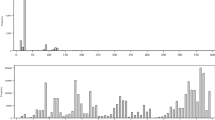Conclusion
In this paper, we have provided some support for several hypotheses about the determinants of which governors get reelected. The benefit from being a member of a particular party varies from state to state and from year to year. Personal characteristics such as age are also important. The logits give some support to the importance of coalition formation; reelection is easier in states with low voter turnout and in farm states. The paper is most concerned with the connection between the economic performance and the electoral success of incumbent candidates for governor, and we find support for a model of electoral acountability, in which governors are powerful in state governments and state governments have the ability to differentially tax fixed factors relative to neighboring states.
This paper raises some important issues regarding the measurement of variables in political economy, which have wide applicability to other studies in the economics of politics. Peltzman (1988) finds that the difference between the growth rate in state personal income and the national growth rate over a one to four year period prior to the election does not affect gubernatorial electoral outcomes. Concurrently, we find that the current year's growth rate in state personal income and its difference from the national growth rate are not significantly related to electoral success but that the average deviation from predicted state personal income during the governor's tenure in office is significantly related to the odds of getting reelected. That is, the data reject simplistic views of voter behavior and support a sophisticated model of voter behavior. Similarly, Peltzman (1988) has greater success using more sophisticated, cumulative measures of national economic performance.
This suggests that great care must sometimes be taken to create variables that are capable of giving our economic models a fair hearing. Voting studies often find that only current period effects matter, which is attributed either to voter myopia or — and this is the more popular explanation nowadays — to the confinement of effects by rational expectations to current period, ‘white noise’ effects. The specifications in these voter studies ignore the cumulative information generated in political economy. Both our results and Peltzman's (1988) results suggest that variables that reflect this cumulative information may be more successful than variables that are based only on the current year.
Similar content being viewed by others
References
Adams, J.D., and Kenny, L.W. (1986). Optimal tenure of elected public officials. Journal of Law and Economics 29 (October): 303–328.
Adams, J.D. (1986). Equilibrium taxation and experience rating in a federal system of unemployment insurance. Journal of Public Economics 29 (February): 51–77.
Chamberlain, G. (1980). Analysis of covariance with qualitative data. Review of Economic Studies 47 (January): 225–238.
Epple, D., and Zelenitz, A. (1981). The implications of competition among jurisdictions: Does Tiebout need politics? Journal of Political Economy 89 (December): 1197–1218.
Fair, R.C. (1978). The effect of economic events on votes for President. Review of Economics and Statistics 60 (May): 159–173.
Glashan, R.R. (1979). American governors and gubernatorial elections 1775–1978. Westport, CT: Meckler.
Hall, R.E. (1978). Stochastic implications of the life cycle — Permanent income hypothesis: Theory and evidence. Journal of Political Economy 86 (December): 971–988.
Kramer, G.H. (1971). Short-term fluctuations in U.S. voting behavior, 1896–1964. American Political Science Review 65 (March): 131–143.
Meltzer, A.H., and Vellrath, M. (1975). The effects of economic policies on votes for the presidency: Some evidence from recent elections. Journal of Law and Economics 18 (December): 781–798.
Peltzman, S. (1987). Economic conditions and gubernatorial elections. American Economic Review, Papers and Proceedings 77 (May): 293–297.
Peltzman, S. (1988). How efficient is the voting market? Center for the Study of the Economy and the State, University of Chicago, Working Paper No. 53.
Stigler, G.J. (1973). General economic conditions and national elections. American Economic Review, Papers and Proceedings 63 (May): 160–167.
Author information
Authors and Affiliations
Additional information
We would like to thank the referee. Debashis Pal, Amy Schmidt, Torsten Schmidt, and Roland Sturm aided in gathering the data.
Rights and permissions
About this article
Cite this article
Adams, J.D., Kenny, L.W. The retention of state governors. Public Choice 62, 1–13 (1989). https://doi.org/10.1007/BF00168010
Issue Date:
DOI: https://doi.org/10.1007/BF00168010




